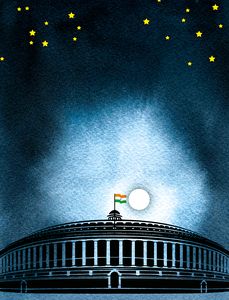Sumitra Mahajan has proved that absolute majority for a party is no guarantee that the Lok Sabha can be run. The speaker has allowed the second half of the budget session to be a washout, without using the weapons of persuasion and discipline available to presiding officers. She has also been helpless because the leader of the house, Prime Minister Narendra Modi, and his team of parliamentary managers have adopted the strategy of some earlier governments—“no business is good business”.
Faced with an embarrassing banking scam, and the possibility of other uncomfortable questions, the government hid behind the regional parties from Andhra Pradesh and Tamil Nadu to cause instant adjournments of the Lok Sabha and Rajya Sabha. In the upper house, despite his brave and emotional speeches, Venkaiah Naidu also went for instant adjournments, except on the day of farewell for retiring members.
Though the blame for the washout should be laid at the door of all disrupting parties, it is the government, which commands majority in the Lok Sabha, which is most responsible. Parliamentary Affairs Minister Ananth Kumar, who had adopted the tactics of his mentor Pramod Mahajan (who handled the portfolio during the A.B. Vajpayee era) of reaching out to opposition and supporting parties, was conspicuous by his aloofness. Obviously, he was bound by the government strategy that awkward questions should not be raised about issues handled by the prime minister and his top ministers on the banking scam, Rafale deal, data leakage and dilution of the anti-atrocities law by the Supreme Court. Even a no confidence motion, which has assumed top priority for discussion and voting, was not allowed to be presented, thanks to “friendly” and “unfriendly” obstructions.
There was an eerie resemblance to the last two years of the Manmohan Singh government, when Parliament was continuously paralysed for session after session. As the principal opposition then, the BJP had argued that it was the duty of the government to ensure the house was run. Now, the parties have swapped positions, but the argument remains the same. The legislative agenda of the government, which included passing of major legislations, is in limbo.
As the government enters its last year, in May, there are three more sessions of Parliament—monsoon and winter in 2018, and a truncated budget session in 2019—before the Lok Sabha elections. Parliamentary paralysis seems to be foretold, unless the government gets out of its opportunistic paralysis.
sachi@theweek.in


